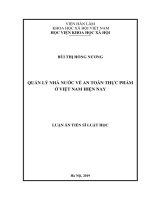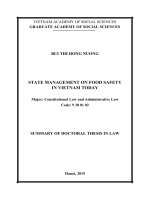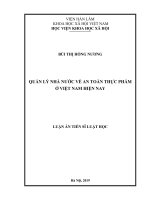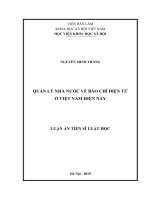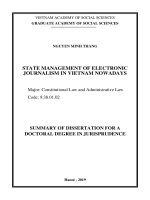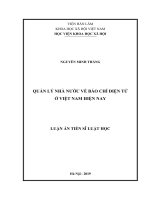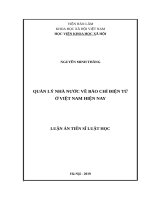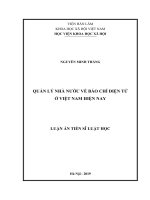Quản lý nhà nước về an toàn thực phẩm ở việt nam hiện nay tt tiếng anh
Bạn đang xem bản rút gọn của tài liệu. Xem và tải ngay bản đầy đủ của tài liệu tại đây (138.94 KB, 27 trang )
VIETNAM ACADEMY OF SOCIAL SCIENCES
GRADUATE ACADEMY OF SOCIAL SCIENCES
BUI THI HONG NUONG
STATE MANAGEMENT ON FOOD SAFETY IN
VIETNAM TODAY
Major: Constitutional Law and Administrative Law
Code: 9 38 01 02
SUMMARY OF DOCTORAL THESIS IN LAW
Hanoi, 2019
Made at
Vietnam Academy of Social Sciences
Graduate Academy of Social Sciences
Scientific supervisors: Assoc. Prof. PhD. Vu Thu
Reviewer 1:
Reviewer 2:
Reviewer 3:
The thesis is defended in the presence of the Academy-level
Council of Thesis Examiners at Vietnam Academy of Social
Sciences, Graduate Academy of Social Sciences, located at 477
Nguyen Trai, Thanh Xuan, Hanoi.
At……(hour)…….(min), (day) ……(month)……2019
The thesis is found in the following libraries:
- Library of Vietnam Academy of Social Sciences
- National Library of Vietnam
PREAMBLE
1. Necessity of the title
Food safety is of special importance to the human health and
the society. Food safety assurance now receives special attention
from many countries including developed and developing countries,
especially Asian countries where strong socioeconomic development
is seen. Increased concentration of residential areas in urban areas,
cities and industrial parks under modernization as well as expansion
of international exchange has required each country not only to
increase quantity of produced food but also to assure safe quality and
highly nutritional value for domestic and export consumer’s food.
Since Vietnam’s official membership of the World Trade
Organization (WTO), food safety quality control has received special
attention because of its role. Therefore, faced with integration and
globalization trend, Vietnam has become an official member of WTO
and realized AFTA. As a result, production and processing of high
quality food that meets consumer’s demands and food safety quality
become quite necessary.
Over the past years, the Communist Party, the Government and
the State of Vietnam has paid attention to guiding the Ministry of
Health, the Ministry of Agriculture and Rural Development, the
Ministry of Science and Technology through actively and proactively
carrying out State management activities in the field of food safety
assurance for the people. Institution, administrative apparatus,
personnel and public finance have been gradually consolidated to
basically meet the State management requirements and international
integration in terms of food safety assurance.
At present, Vietnam is now facing many big changes,
including matters related to food safety assurance for the society such
as quick growth of quantity and scale of food production, processing
and trading facilities; diversification of food items; diversification of
product users and food supply services; economic integration in
multilateral goods exchange in the world, etc. Besides, in some
places, fruit and vegetable are poisoned by toxic chemicals; cattle,
poultry and seafood meat in some production facilities have residual
antibiotic and hormone; chemicals and additives in food processing
and storage are not used correctly; trading food and catering service
at marketplaces, streets, tourism resorts, festivals, schools and
hospitals have not been managed well; food poisoning at collective
1
kitchens, industrial parks and schools still occurs, affecting the
people’s health and economic and tourism development as well as
urban civilization. Fake food with poor quality and food trafficked
across border have not been controlled strictly; legal violations have
not been handled timely and strictly. Environmental sanitation and
food safety have not been controlled strictly.
Over the past time, the State management on food safety, apart
from achievements, has remained much limited and inadequate. For
example, although awareness of the leaders, mangers, producers,
traders and consumers has gained initial improvements, it is not yet
sustainable, especially in the present market economic condition;
legal documents on food safety lack uniformity; apparatus
organization of the State management on food safety from the
Central government to local governments are inconsistent; the role of
People’s Committees at levels has not been brought into full play;
annual State budget for food safety assurance has not been unable to
meet actual demands and mobilize social resources; inspection and
dealing with violations on food safety have not followed hard on
actual development of the country; communication and education on
food safety have not been efficient.
For these above reasons, the author has selected the research
title: “State management on Food safety in Vietnam today” for the
Doctoral thesis in Law. This title is of theoretical and practical
significance at present.
2. Research purposes and tasks
2.1. Research purposes
General purpose: General purpose of the thesis is to put forth
viewpoint and solution to improve efficiency of the State
management on food safety in the present period based on analyzing
and clarifying theoretical and practical aspects of the State
management on food safety in Vietnam and experience of some
countries in the world.
Specific purpose: To obtain general purpose, it is necessary to
realize the following specific purposes:
Firstly, the Thesis evaluates domestic and foreign researches
related to the State management on food safety, determines research
questions and research hypothesis.
Secondly, the Thesis formulates the concept of State
management on food safety, characteristics and role of the State
2
management on food safety, points out necessity of the State
management on food safety in Vietnam at present.
Thirdly, the Thesis analyzes advantages and disadvantages of
the State management on food safety in Vietnam over the past time.
Fourthly, the Thesis puts forth viewpoints and proposes
solution to improve efficiency of the State management on food
safety in Vietnam in the coming time.
2.2. Research task
In order to obtain the above purpose, research task of the title
focuses on the following matters:
Firstly, surveying domestic and foreign researches related to
the research title, pointing out findings and contents to inherit and
develop and new contents to be resolved by the thesis.
Secondly, studying theoretical basis of the State management
on food safety: concept, characteristics, role, principle, method and
tools of the State management on food safety; contents of the State
management on food safety; determinants on efficiency of the State
management on food safety; experience of some countries in the
State management on food safety, reference value for Vietnam in
improving efficiency of the State management on food safety.
Thirdly, analyzing actual State management on food safety in:
formulating and promulgating policies and laws; organizing
compliance with the laws on food safety; inspecting and solving
complaints and denunciations against food safety violators;
penalizing violations by food processing facilities and conducting
international cooperation in the field of food safety.
Fourthly, based on analysis, pointing out limitations and gaps in
the State management at present to propose solutions to improve
efficiency of the State management on food safety. Proposing such
solutions as completing legal documents; organizing follow-up;
organizing communication and education; fortifying regional integration
and cooperation; optimizing international support in food safety
assurance; applying food safety standards; socializing food safety.
3. Research object and scope of the thesis
3.1. Research object
Research object of the title is legal documents on food safety;
scientific works, reports, summary and evaluation documents on the
State management on food safety; content of the State management
on food safety, actual State management on food safety by agencies
and organizations at present.
3
3.2. Research scope
In terms of time: The thesis studies the State management on
food safety from 2010 (since the Law on food safety) to 2017.
In terms of space: State management on food safety at the
State management agencies such as Ministry of Health, Ministry of
Agriculture and Rural Development and Ministry of Science and
Technology. However, within research scope of the Thesis, the author
focuses on studying the State management by the Ministry of Health
in the field of food safety. The Thesis studies the State management
on food safety in some countries. The Thesis doesn’t study other
fields related to health.
In terms of content:
Firstly, the Thesis studies theoretical issues of the State
management on food safety.
Secondly, the Thesis studies actual State management on food
safety in Vietnam.
Thirdly, the Thesis studies viewpoints and solutions to improve
State management on food safety in Vietnam in Vietnam at present.
4. Methodology and research method of the thesis
4.1. Methodology
The Thesis employs dialectical materialism and historical
materialism methodology to make sure that the perception about the
State management on food safety always assures logics between
visual perception and thinking and practice, in the dialectical
relationship among divisions in the same system, between the system
and the surrounding environment and in accordance with its
movement rules.
4.2. Specific research method
To realize the content of the Thesis, the author employs the
following specific research methods:
Information collection: collecting 2nd level information and
data based on announced documents or statements other than the
information initially collected by the author. This method is
employed in all chapters of the thesis and focuses on the chapter
concerning overview of research. This method is employed in
surveying researches related to the title, analyzing main contents,
used methods and conclusions reached as well as points subject to
further research in previous researches. Through employing this
method, the author has inherited some basic contents related to the
State management on food safety and applied to analyzing the
4
content of other chapters of the thesis.
During research, the author has studied legal documents,
scientific research titles, theses, references, monographs and journals
related to the State management on food safety.
Analysis, summarization: This method is used mainly in
Chapter and Chapter 4 of the thesis. Analysis is firstly dividing the
overview of the research object into simpler components and aspects
to study, detect attributes and nature of such factors, thereby enabling
us to understand the research object more coherently, understand the
complicated overview from such factors. Analysis is aimed at finding
the general from the specific, finding the nature from phenomena and
finding the common from the characteristic.
Summarization is summarizing the results of studying single
aspect and single matter to gain comprehensive and proper
perception on the general, thereby studying each research object.
Analysis method is employed to make more profound
assessment on different aspect of the State management on food
safety whereas summarization method is used to generalize analysis
results to put forth general judgments and assessments on the State
management on food safety in the whole of different relationships
and aspects of the State management on food safety in Vietnam at
present. Analysis and summarization are also used to evaluate
achievements and limitations, inadequacies in the State management
on food safety over the past years.
Logic - historic method: State management on food safety by
periods. In each period, based on theories, application results and
practice, appropriate solutions are proposed. Therefore, the author
uses this method to study chapter 1, chapter 2, chapter 3 and chapter
4 of the Thesis.
Statistical and description method: Quantitative information
collected from statistical documents concerning the State
management on food safety is used, processed, arranged and
simulated in the form of tables, schedules and diagrams to prove
quantitative evidence about analyses or judgments on the State
management on food safety.
Inductive and interpretation method: During research, the author
comes from the specific to the general, from single objects to common
principles. Besides, the author uses interpretation method in studying the
State management on food safety. Based on the data collected by the author
mainly from the Ministry of Health, the Government’s reports, the
5
author summarizes into judgments and assessments.
5. New scientific contributions by the thesis
5.1. New theoretical contributions
Firstly, the Thesis clarifies and deepens theoretical issues
concerning the State management on food safety. The Thesis puts
forth some scientific concepts, some scientific conclusions, thereby
contributing to completing theory and improving efficiency of the
State management on food safety.
Secondly, the Thesis clarifies the content concerning the State
management on food safety (Formulating and promulgating policies
and laws on food safety; organizing compliance with the laws on
food safety; inspecting and solving complaints and denunciations
against food safety violators; penalizing violations by food
processing facilities; conducting international cooperation in the field
of food safety.); studies experience of the State management on food
safety in developed countries and EU countries and reference value
for Vietnam. Judgments and evaluations by the Thesis provide
researchers, managers and especially policy makers of the State
authorities with comprehensive and complete view on the
regulations, application of the State management on food safety.
5.2. New practical contributions
Firstly, the Thesis contributes to changing awareness and action
for the leaders, managers, producers and traders involved in food safety.
Secondly, the Thesis proposes solutions to improve efficiency
of the State management on food safety in Vietnam, in accordance
with international practices, creating uniform and comprehensive
legal basis that meets practical requirements at present; creating
favorable conditions for the people’s health assurance.
Thirdly, the Thesis is an in-depth scientific research with
theoretical and practical value, serving as a basis for developing
further researches.
6. Theoretical and practical significance of the thesis
Research findings of the thesis are important contributions to
the theoretical development of the State management on food safety,
thereby contributing to improving theoretical awareness of role and
value of the State management on food safety in Vietnam.
The Thesis can be used as reference for the State management
on health; as teaching reference for training classes on food safety for
health officials; teaching reference for training classes for the
officials involved in the State management on food safety and
6
officials at the State administrative authorities.
7. Structure of the thesis
Apart from the Preamble, Conclusion, List of references,
Appendix, the Thesis is comprised of 4 chapters:
Chapter 1. Overview of research.
Chapter 2. Theoretical issues of the State management on
food safety.
Chapter 3. Actual State management on food safety in
Vietnam.
Chapter 4. Viewpoints and solutions to improve efficiency of
the State management on food safety in Vietnam today.
Chapter 1
OVERVIEW OF RESEARCH
1.1. Research situation
1.1.1. Domestic research situation
Firstly, the group of researches related to the theory of the
State management on food safety. In general, such researches have
pointed out the urgency of food safety; administrative reform on food
safety; role of officials towards food safety.
Secondly, the group of researches related to actual State
management on food safety. In general, such researches have studied
actual food safety management in some places (Tuyen Quang);
evaluated the Law on food safety, points out some conclusions and
recommendations. However, such researches fail to analyze the State
management on food safety practically and comprehensively.
Thirdly, the group of researches related to solutions to the State
management on food safety. In general, such researches have
proposed such solutions as Completing organization and operation of
the administrative apparatus for food safety assurance in Health
sector, gradually completing health laws through formulating and
promulgating legal documents, accomplishing food safety and
hygiene inspection system in Vietnam Health sector.
1.1.2. Foreign research situation
In general, foreign researches have mentioned food safety,
food poisoning, reason for food poisoning and street food. Main
contents regarding the State management on food safety have not
been studied scientifically, comprehensively and fully by such
researches. Therefore, further research on the State management on
7
food safety in Vietnam and experiences of other countries in this
regard is necessary.
1.2. Assessment on research situation
On the one hand, researches have systematized basic theory of
food safety, consequences of food poisoning for individuals and the
society; general issues on health laws; determinants on the State
management on food safety, necessity for fortifying the role of State
management on food safety; management principles and food safety
assurance conditions.
On the other hand, researches have studied actual food safety
in some places such as Thai Nguyen, lack of food safety in
agricultural production; food processing; food business and
circulation in the market; imported and exported food; knowledge,
practice by groups of objects involved in food supply chain.
However, over the past time, there has been no in-depth
scientific angle of Law, the contents of the Thesis such as
characteristics, form, method, content of the State management on
food safety; actual State management on food safety in Vietnam over
the past time; solutions to improve efficiency of the State
management on food safety in Vietnam are not mentioned in previous
scientific works. The above researches have provided an important
basis for the author to conduct an in-depth research on the State
management on food safety in Vietnam today. research on the State
management on food safety. From the
1.3. Issues subject to further research
1.3.1. Issues subject to further research
Firstly, the Thesis continues to complete basic theory of the
State management on food safety: concept, characteristics, role,
principle, method and tools of the State management on food safety.
Secondly, the Thesis continues to study practical State
management on food safety as follows: Formulating and
promulgating policies and laws; organizing compliance with the laws
on food safety; dealing with violations by food processing facilities;
conducting international cooperation in the field of food safety.
Thirdly, the Thesis studies determinants on efficiency of the
State management on food safety today such as Guidelines of the
Communist Party and the State of Vietnam; policies and laws as legal
framework for food safety.
Fourthly, experience of some developed countries and developing
countries on the State management on food safety, reference
8
value for Vietnam in improving efficiency of the State management
on food safety are mentioned by the author in the Thesis.
Fifthly, actual State management on food safety is mentioned by
the author in chapter 3 of the Thesis; analyzing, evaluating
achievements, shortcomings, limitations and reasons in: formulating and
promulgating policies and laws; organizing compliance with the laws on
food safety; dealing with violations by food processing facilities;
conducting international cooperation in the field of food safety.
Sixthly, viewpoints by the Communist Party and the State of
Vietnam on the State management on food safety are specified by the
author in chapter 4: objective of protecting human rights, civil rights;
business freedom and maintenance of healthy competitive
environment; socialization of food safety.
Seventhly, the Thesis proposes some solutions to improve
efficiency of the State management on food safety in Vietnam in the
coming years.
1.3.2. Research questions
From the “gap” of related researches, the PhD candidate
determines the following research questions of the thesis:
Firstly, what the contents of State management on food safety
and determinants on the efficiency and effectiveness of the State
management on food safety in Vietnam today?
Secondly, how is practical State management on food safety in
Vietnam today?
Thirdly, what are viewpoints and solutions to improve
efficiency and effectiveness of the State management on food safety
in Vietnam?
1.3.3. Research hypothesis
Based on perception and surveys, the thesis will collect and
process information in order to verify the following hypotheses:
Hypothesis 1. State management on food safety fails to cope
with the present complicated food safety lack in Vietnam.
Hypothesis 2. Improving efficiency and effectiveness of State
management on food safety is assigning specific and clear
responsibilities to each sector, each agency and each organization in
realizing healthcare objectives and solutions, firstly in food safety
assurance. In addition, food is a kind of strategic product. Apart from
economic significance, it also has very important political
significance of each country.
9
Chapter 2
THEORETICAL ISSUES OF STATE MANAGEMENT ON
FOOD SAFETY
2.1. Concept, characteristics and role of the State
management on food safety
2.1.1. Concept of State management on food safety
State management on food safety is exercising the State power
by the agencies in the State apparatus (mainly executive agencies),
representing the State power, mainly through the laws, to adjust
human behaviors and activities in the field of food safety in order to
meet human demands, assure the people’s health, maintain social
stability and development in human health.
2.1.2. Characteristics of State management on food safety
State management on food safety is realized by the competent
State agencies and individuals; State management on food safety
represents the State power; State management on food safety is
conducted by the subjects with executive power; State management
on food safety is always realized jointly by the State management
agencies in order to reach optimal efficiency.
2.1.3. Role of the State towards food safety
Firstly, the State plans and promulgates legal documents
related to food safety to guide food producers and traders through
making plans for producing clean and safe food. The State is the
connection that creates trust for consumers so that they feel more
assured to use products and services in the market. During integration
and development, the State must make sure that the food meets
international quality standard in import and export in foreign markets.
2.1.4. Principle of food safety management
Firstly, food safety assurance is the responsibility of all food
producers and traders. Secondly, food production and business are
conditional operation; food producers and traders must bear
responsibility for the safety of their own products. Thirdly, food
safety management must be based on relevant technical standards
and regulations promulgated by the competent State management
agencies and standards applied by producers.
10
2.1.5. Form of State management on food safety
Firstly, promulgating general and key decisions; Secondly,
promulgating normative decisions; Thirdly, promulgating specific
documents applying legal norms.
2.1.6. Method of State management on food safety
Firstly, based on the nature of impact, State administrative
management methods are classified as: administrative method and
economic method. Secondly, based on the level of impact, State
administrative management methods are classified as: adjustment
method, general leadership method and direct management method.
2.1.7. Tools of State management on food safety
State management on food safety uses the main following
tools: Policy, law; planning, plan.
2.2. Content of State management on food safety
2.2.1. Formulating and promulgating policies and laws on
food safety
Firstly, formulating and guiding through implementing
development strategy and plan; Secondly, formulating and
promulgating legal documents on food safety.
2.2.2. Organizing follow-up of laws on food safety
Firstly, building management apparatus and officials for food
safety management; Secondly, building, improving quality and
responsibility of management officials in the State administrative
agencies for food safety; Thirdly, organizing and creating favorable
conditions for Vietnamese agencies, organizations and individuals.
2.2.3. Inspecting and solving complaints and denunciations
against food safety violators
Firstly, inspecting food safety violators; Secondly, inspecting
compliance with laws at food processing facilities; Thirdly,
inspecting production and processing at food processing facilities;
Fourthly, solving food safety complaints and denunciations.
2.2.4. Penalizing violations by food safety processing
individuals and facilities
Penalizing administrative violations in the field of food safety
is the fact that the competent person applies methods of penalizing
and remedying consequences to the individuals and organizations
11
committing administrative violations in the field of food safety under
the laws.
2.2.5. International cooperation in the field of food safety
At present, WHO (World Health Organization) has formulated
food safety strategies for the West Pacific region in order to reduce
incidence and mortality rates due to food poisoning.
2.3. Determinants on efficiency of the State management on
food safety in Vietnam today.
Guidelines of the Communist Party and the State of Vietnam
on food safety assurance; Policies and laws as legal framework for
food safety; State management officials on food safety; People’s
intellectual standard and social support; Equipments and means;
Coordination by the State management agencies; International
cooperation.
2.4. Experience of the State management on food safety in
some countries and reference value for Vietnam.
2.4.1. Experience of State management on food safety in
some countries. The thesis studies experience of developed countries
and EU countries.
2.4.2. Reference value for Vietnam concerning State
management on food safety: It is necessary to establish a food control
system in the following principle: analyzing threat, accessing and
managing the system of “preventing, controlling and handling” and
controlling the whole food cycle from “farm to dining table”; it is
necessary to establish a uniform system of legal regulations; establish a
food safety management and control apparatus with a single unified
contact with food safety management agency like in the USA.
12
Chapter 3
ACTUAL STATE MANAGEMENT ON
FOOD SAFETY IN VIETNAM
3.1. Actual food safety in Vietnam today
3.1.1. Food poisoning
In Vietnam, according to the Government’s report, in the
period of 2011 - 2016, all over the country, there were 1,007 food
poisoning cases with 30,395 people infected and 164 dead people.
Food poisoning due to microorganism was found in 405 people.
18,913 people were infected with food poisoning and 05 people died.
Food poisoning due to chemicals and natural toxin in the period of
2011 - 2016 was found in 324 people. 3,646 people were infected
with poisoning and 146 people died; food poisoning due to undefined
reasons was found in 268 people. 7,836 people were infected with
poisoning and 13 people died [35].
3.1.2. Prevention of food poisoning and food infections
According to the survey at 06 Specialized Institutes and Thua
Thien Hue Center for Drug, Cosmetic and Food Testing, the units
have made their plans, 1143 food samples in 13 groups of food
samples with 28 monitoring targets, 164/1143 samples were found
unqualified (14.3%). In the localities, 9,685 food samples were
monitored with 85.8% sample subject to regular monitoring.
Monitored food samples are mainly domestic food (occupying
99.97%). The rate of samples tested at the Preventive Health Center
is 59.53%. The rate of samples subject to quick test is 29.49% and
the rate of samples tested at regional Institutes and other units is
29.98% [35].
3.2. Actual laws on State management on food safety
3.2.1. Laws on food safety management apparatus
Over the past time, the Law on food safety has been
promulgated and development documents have also been
promulgated and optimized: Decrees, Circulars and instructive
documents.
3.2.2. Form and method of State management on food safety
Form of State management on food safety: Normative
decisions are promulgated: Documents related to food safety such as
13
1) Law on food safety 2010; Decree No. 15/2018/ND-CP dated
02/02/2018; Decree No. 115/2018/ND-CP dated 04/9/2018. Specific
documents on application of legal norms are promulgated.
Method of State management on food safety: Apart from
promulgating documents to regulate and exercise State management
on food safety, the State administrative agencies have adopted such
methods as Administrative method and Economic method.
3.3. Practical State management on food safety
3.3.1. Formulation and promulgation of policies and laws on
food safety
Formulation, guidance through implementing development
strategy and plan; Preparation, verification and promulgation of legal
documents on food safety have been gradually realized under a
unified and strict process because the laws on promulgating
documents are also gradually established, creating favorable
conditions for implementers to contribute their ideas to draft
documents.
3.3.2. Compliance with the laws on food safety
3.3.2.1. Management apparatus establishment
At the Central level, under the Law on food safety, State
management on food safety is assigned to three Ministries: Ministry of
Health, Ministry of Agriculture and Rural Development and the Ministry
of Industry and Trade as shown in Article 62, Article 63 and Article 64
of the Law in the management principle based on food supply chain with
each group of food and business lines. The Ministry of Health bears
responsibility to the Government for unified State management on food
safety. At each Ministry, there is a unit assisting the Minister in
conducting State management on food safety.
At local level, People’s Committees at various levels conduct
State management on food safety within their local scope. Provincial
People’s Committee is assisted by the Department of Health,
Department of Agriculture and Rural Development, Department of
Industry and Trade and Department of Health. District People’s
Committee is assisted by professional agencies under District People’s
Committee including Division of Health, Division of Agriculture and
Rural Development or Economic Division. Communal, ward and town
14
Health Centers only have officials taking charge of health fields,
including food safety. There are no food safety officials.
3.3.2.2. Food safety management personnel
According to statistical table 3.2, i) number of officials all over
the country involved in State management on food safety is 5212
people, including 120 full-time officials at Central level, occupying
2.30%. These officials take charge of formulating policies and legal
documents and bylaws in order to manage and regulate food safety
towards subordinate agencies; ii) At provincial level: 60 Departments
of Food Safety have 2,373 full-time officials, occupying 14.74%. As
such, each department as 19 full-time officials on average; iii) at
district, it is estimated that throughout the country, there are 1,949
people involved in food safety quality management, occupying
12.10% of total food safety officials (3 officials per district on
average); iiii) at communal level, it is estimated that throughout the
country, there are 11,516 people involved in food safety quality
management, occupying 71.54% (1.05 person per commune on
average) (non-specialized). These people are not paid salary because
agencies at communal/ward level are not entrusted with food safety
management.
3.3.2.3. Organization and creation of conditions for food
processing facilities to exercise rights and responsibilities under the
laws.
In 2010, the Law on food safety was promulgated, serving as
the document with the highest legality in the field of food safety
today. Besides, related Ministries and sectors promulgated a wide
range of Decisions and Circulars.
Interdisciplinary coordination in food safety management at
the Central level. Interdisciplinary coordination in food safety
management is realized consistently under the guidance of the
Central Interdisciplinary Guidance Board on Food Safety, focusing
on interdisciplinary inspection on food safety, dealing with food
safety troubles, solving difficulties in assignment and
decentralization. Under the guidance by the Central Interdisciplinary
Guidance Board on Food Safety, the Ministry of Health - Ministry of
15
Agriculture and Rural Development - Ministry of Industry and Trade
have coordinated in formulating the Law on food safety.
3.3.2.5. Compliance with the laws on food safety in food
processing and business
According to the reports by 63 provinces/cities all over the
country, by the end of 2016, in spite of tremendous efforts, so far,
only 163,877 facilities with food safety eligibility have been licensed.
The reason is that physical conditions of food processing and trading
facilities have limited hygiene. The governments at various levels
have not actually embarked in whereas personnel in this field
remains deficient, especially at communal and ward level.
3.3.2.6. Budget for State management on food safety
Budget for food safety remains inconsiderable: 1) Central
budget (from nonbusiness expenditure source, National target
program for food safety): 1,369.770 billion VND; 2) Local budget:
(from nonbusiness expenditure source, National target program for
food safety): 122.8 billion VND; 3) Revenue reserved for food safety
management (fines from administrative violations): 1,053.22 billion
VND; 4) Other financial sources (international funding, contributions
by organizations or individuals): about 5,410 billion VND (Report by
the Ministry of Finance) [35].
3.3.2.7. Physical facilities and equipment for State
management on food safety
At the Central level, the units directly under the Ministry have
basically been provided with working head office with sufficient
working equipments and conditions to carry out their tasks.
Specialized testing divisions have been invested and upgraded
basically to meet the task requirements. State budget for building and
completing technical facilities and infrastructure for food safety in
the period of 2011 - 2016 is 416.7 billion VND.
3.3.2.8. Communication of the laws on food safety
At the Central level, in the period of 2011 - 2016, relevant
units of three sectors: Health, Agriculture and Rural Development,
Industry and Trade verified documents and issued Confirmation of
food advertisement content to 14,978 documents of domestic and
imported food production and trading facilities [35].
16
3.3.3. Inspection and handling of complaints and
denunciations against food safety violators
3.3.3.1. Inspection over compliance with the laws at food
processing facilities.
Annual inspection over food safety is realized under the Plan
by the Central Interdisciplinary Guidance Board on Food Safety,
especially at the Lunar New Year and the Action Month for Food
Safety and Mid-Autumn Festival. In the period of 2011 - 2016, the
whole country set up 153,493 interdisciplinary inspection groups
attended by relevant sectors: Health, Agriculture and Rural
Development, Industry and Trade, Public Security, Science and
Technology, Education and Training. Inspection was done at
3,350,035 facilities, detecting 678,755 violating facilities, occupying
20.3% [35].
3.3.2. Inspection and handling of administrative violations
According to statistics from the reports made by 45
provincial/city People’s Committees, in the period of 2011 - 2016,
there were 124,957 food safety inspection groups in 45 provinces;
436,311 violations, 211 billion VND as fines, 24,748 tons products
destroyed. Violations were mainly found in hygiene conditions,
equipments, labeling, food advertisement, food with poor quality and
unclear origin.
3.3.3.3. Settlement of complaints and denunciations against
food safety violators
In the period of 2011 - 2016, according to statistics from
provinces, relevant agencies received 85,050 complaints,
denunciations and motions including some crowed delegations. In
addition, relevant sectors received 180 letters of complaint,
denunciation within the competence of administrative agencies at
various levels (70,042 letters of complaint and 523 letters of
denunciation) [35].
3.3.4. Handling of violations by food processing facilities
For the first time, food safety violation is defined in Article
317 of the Criminal Code 2015 under the Law on amending some
articles of the Criminal Code 100/2015/QH13 on “Food safety
violation”. Different penalties depend on the level of violation.
17
According to statistics from Food safety inspection from 2011
to 2016, among 678,755 violating facilities, only 136,545 facilities
were handled, occupying 20.1% with average fine of 200,000 VND
per case [35].
3.3.5. International cooperation in the field of food safety
For international cooperation and WTO membership, Vietnam has
had many projects and Agreements. Vietnam joins WTO as a member.
Vietnam has been unable to undertake food safety projects. The reason is
that international food safety standards are difficult to apply in Vietnam
and infeasible; the State management apparatus from the Central level to
the local level is not uniform and unified; the laws of Vietnam have no
strict regulations and execution is not effective.
3.4. Assessment on actual State management on food safety
3.4.1. Achievements
Firstly, in terms of formulation and promulgation of legal
documents on food safety. Statistics from Ministries and People’s
Committees of 63 provinces/cities, in the period of 2011 - 2016,
Vietnamese legal system on food safety had 158 legal documents
promulgated by the central agencies.
Secondly, in terms of State management apparatus on food
safety. Food safety management agencies have been established,
including Sub-Department of Food Safety, Sub-Department of
Quality Control of Agriculture, Forestry and Aquatic Products; SubDepartment of Market Management with clear and specific task
assignment among such Sub-Departments under the Law on food
safety and bylaws.
Thirdly, in terms of inspection system. At the Central level:
Department of Food Safety is assigned to inspect food safety from
01/11/2008 with functions, tasks, authority, personnel organization
and working relationship of Inspector of the Department regulated in
the Decision No. 1919/QD-BYT. Until now, Department Inspector
has 12 officials.
Fourthly, handling of food safety violations. Application and
compliance with regulations on penalizing administrative violations
in food safety over the past years have been considered,
communicated and followed up by Party committees, heads of
relevant units with active achievements, contributing to control food
18
poisoning and increased administrative violations in the field of food
safety.
Fifthly, in terms of communication and education on food
safety. Communication and education to improve the people’s
awareness of knowledge and laws on food safety have been
considered and maintained regularly by the governments at various
levels, creating food safety awareness changes for managers,
producers - traders and consumers.
Sixthly, inspection and post-check. Inspection and post-check
after food safety inspection system have been better than in the past;
this work has been gradually kept in good order, especially
intensified interdisciplinary coordination, avoiding overlapping and
improving working quality.
3.4.2. Shortcomings, limitations and reasons
3.4.2.1. Shortcomings and limitations
Legal documents on food safety. Law on food safety 2010 is
the document with highest legality in the field of food safety.
However, during implementation, this Law shows some limitations.
State management apparatus on food safety. Food safety
management officials remain deficient in quantity and poor in
qualifications. In particular, officials at grassroots level have no
intensive knowledge on food safety, which makes document
understanding and application incorrect and inefficient.
Compliance with the laws on food safety. Compliance with the
laws in many localities remains formalistic, spreading and unqualified.
Violations are not publicized and handled strictly. Production and
trading facilities are not encouraged to make safe food.
Food safety inspection. Coordination mechanism between
specialized inspectors and market management agencies, People’s
Committees at various levels and agencies, organizations related to
food safety inspection has not been regularly in details, resulting in
many inadequacies in food safety inspection.
Food safety violation handling. Handling of violations is not
resolute, especially at communal and ward levels because relevant
officials lack professional capacity and tend to avoid collision during
inspection. In particular, at communal level, there are no food safety
officials.
19
Communication and education on food safety. Information
remains inaccurate or unreliable, unscientific, affecting production,
business and the people’s trust in food safety management.
State management agencies on food safety. Such agencies are
not compatible with their tasks; forces are dispersed in many
ministries and sectors, units; thus, the implementation is not uniform
and inefficient.
Limited coordination between State management agencies on
food safety. Many Interdisciplinary Guidance Boards on Food Safety
have not worked effectively. Many officials have not followed hard
on implementation process, resulting in low efficiency. In particular,
at communal and ward level, most officials in the Guidance Board
have to assume other positions, thus they have not concentrated on
their work.
Investment expenditure for food safety management has not
met requirements. Implementation rate remains low due to reduction
and delay in funding.
3.4.2.2. Reasons
Firstly, the awareness of some Party committees, governments,
officials and managers on the role of food safety is not sufficient; the
force in charge of executing State management tasks remain weak;
Secondly, State management apparatus on food safety remains weak,
dispersed and not uniform; Thirdly, food safety inspection force remains
inconsiderable, especially at district and communal levels (district health
sector has not specialized inspection network, communal health sector
has food safety officials who have to undertake other positions);
Fourthly, Food safety quality control apparatus from the Central level to
the local level has been formulated and completed to carry out their
functions and tasks. Fifthly, experience of food safety management
officials has not met task requirements and international and regional
integration trend. Sixthly, food safety management officials remain
deficient in quantity and weak in qualification. Seventhly, inspection and
handling of food safety violations remain limited. Capacity of inspection
groups at district and communal levels remains limited, thus impossible
to detect all violations or handle such violations thoroughly.
20
Chapter 4
VIEWPOINTS AND SOLUTIONS TO IMPROVE
EFFICIENCY OF STATE MANAGEMENT ON FOOD
SAFETY IN VIETNAM TODAY
4.1. Viewpoint of improving efficiency of the State
management on food safety
4.1.1. Assuring people’s right to healthcare. Food safety
assurance for people’s health assurance is the investment in the
country’s socioeconomic development, improvement of life quality
for each individual and each family.
4.1.2 Assuring right to business freedom and maintenance of
healthy competitive environment in the field of food safety
Firstly, the State assures business freedom right for production
and business facilities. In fact, at present, production and business
facilities must base on the Law on food safety and subsequent
instructive documents while basing on the Corporate Law.
4.1.3. Socializing food safety
Main objective of socializing food safety quality is to improve
awareness, attitude and behavior of all members in the society
towards food safety quality so that they observe the State laws and
regulations issued by competent authorities in order to assure public
health and personal health.
4.1.4. Intensifying inspection and handling of violations
committed by production and business facilities and supporting
them in improving their responsibility and professional capacity.
4.1.5. Compliance with international practice
Main agreements of WTO include: Agreement on technical
barriers in trade (TBT), Agreement on the application of sanitary and
phyto-sanitary measures (SPS), Agreement on Trade-related Aspects
of Intellectual Property Rights (TRIPS) and General Agreement on
Trade in Services (GATS)
4.2. Solutions to improve the State management on food
safety in Vietnam today
4.2.1. Group of solutions to complete the laws
4.2.1.1. Completing regulations in the documents on food
safety
Further formulating and completing policies and laws on
encouraging development of organic, green and clean agriculture;
21
encouraging food production, processing and investment on a large
scale under production chain with assured food safety.
4.2.1.2. Completing institutions and policies
Further implementing the policy of encouraging enterprises to
invest in agriculture and rural areas such as land use charge
exemption; State land rental and water rental exemption; Land
concentration support, etc.
4.2.2. Group of solutions on follow-up.
4.2.2.1. Organizing the State management apparatus on food
safety
Improving, defining responsibilities of relevant sectors from
the Central level to the grassroots level in inspecting and controlling
food production, processing and import before circulation and
consumption.
4.2.2.2. Improving quality of the State management officials on
food safety
Firstly, improving human resources in food safety assurance
by developing quantity, improving quality and efficiency in use.
Secondly, improving efficiency of leader and manager training.
4.2.2.3. Finance
Financial source is a necessary condition for maintaining the
State management apparatus and deploying activities in the State
management on food safety.
Investing in upgrading and expanding head office and
laboratories of food safety management authorities from the Central
level to the local level to meet task requirements. Modernizing
existing laboratories towards the laboratories of regional countries.
4.2.2.4. Inspecting and checking food safety
Regularly inspecting and checking the compliance with
production processes under the regulations on food safety quality at
food production, processing, trading and service facilities; avoiding
unfinished implementation.
4.2.2.5. Handling violations
At present, handling violations upon detecting food safety
violations remains weak. Economic violation penalization is more
than education and encouragement, thus exerting great influence on
the mood of violators. Therefore, there should be strong sanctions so
22
that producers, processors and traders shall respect the laws on food
safety and consumers.
4.2.2.6. Solving motions, complaints and denunciations on
food safety
Food safety inspectors continue to complete ongoing
inspections; concurrently, conducting inspections as scheduled and
unexpectedly; intensifying guidance, inspection and speeding up
activities of inspection groups, deploying and finishing as scheduled,
inspecting with proper content, scope, clear inspection result and
legal recommendations.
4.2.3. Group of solutions on food safety communication and
education
Coordinating strictly with social - occupational groups and
organizations, residential community to communicate the laws on
food safety to all people so that the people shall not join and support
trafficking, trade fraudulence and production and business of dirty
and unsafe food.
Intensifying communication and education in order to raise the
awareness of the whole society, enterprises and people on food safety,
guidelines, policies, laws and necessary knowledge on food safety.
4.2.4. Intensifying regional integration and cooperation;
optimizing international support on food safety assurance.
Optimizing projects, improving efficiency of international
support through improving coordination among SPS projects and
programs funded by foreign countries and Vietnam.
4.2.5. Adopting food safety standards
At present, many countries and markets accept clean standard
at the level of safety assurance for consumers and have worked out
many management measures in order to control food safety strictly
such as GMP, GAP, SQF, HACCP and ISO 22000.
4.2.6. Socializing food safety
The State entrusts some specific tasks in the field of food
safety to specialized associations; concurrently encouraging
preparation of private laboratories to check food safety quality.
23
